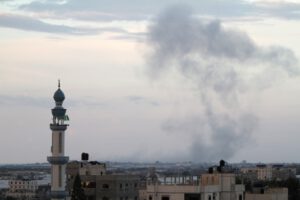
The Arab spring skirted around the central fire in the Middle East: Arab-Israeli conflict. Israel’s actions have wheeled it straight back onto centre stage.
Israel’s decision to assassinate the Hamas chief of staff Ahmed al-Jabari and launch a full-scale air and sea bombardment against the militants in Gaza can be attributed to a number of factors – of which the need to stop missiles raining down on the south of the country is the least convincing. A ceasefire between Israel and Hamas was apparently being negotiated, through Egyptian intelligence, when the decision to kill Jabari was taken. Jabari, a man who undoubtedly dedicated his life to war against Israel, was also the man who enforced the truce for the last five and a half years over armed groups in the strip.
One man involved in the mediation to release Gilad Shalit claimed that hours before he was assassinated Jabari received the draft of a permanent truce agreement. War is never so near when peace is on offer. Recep Tayyip Erdogan, the Turkish prime minister, learned this lesson while trying to mediate peace talks between Syria and Ehud Olmert, just before Operation Cast Lead was launched at the end of 2008. Whatever was going on immediately before the strike on Jabari, a ceasefire has been negotiated after each outbreak of hostilities withGaza militants. What was different this time?
The proximity of the Likud primaries and the general elections in Israel undoubtedly played a role. The attacks on Lebanon in 1996 and Gaza in 2008/9 both happened on the eve of elections, although military action turned into electoral defeat. But at the time the opportunity to turn a drama into a crisis was too good to miss. Prime minister Binyamin Netanyahu had been deprived both of a strike on Iran and a Republican president in the White House. An attack on Gaza re-established his national security credentials while wiping all possible rivals off the television screens, particularly the possible comeback of former premier Olmert, whose boast, too, was that he “took care” of Gaza. Ehud Barak, the defence minister, is fighting for votes just to get back into the Knesset.
The third calculation is the riskiest of the lot. It is not to test Hamas or to re-establish deterrence over other militant groups in Gaza. It is to testEgypt. The biggest difference between the current attack on Gaza and all the other ones is that today the regional furniture has changed. One of the two countries with which Israel had signed a peace treaty has gone through a revolution, bringing Islamists to power, and the other, Jordan, is being rattled by the same forces to its very bones. Kuwait, Bahrain, the Emirates, and parts of Saudi Arabia are all gripped by the same fever. The working assumption was that the further and deeper the Arab spring spread, the more Israel would have to temper the urge to hammer militants in Gaza with the need to keep its peace treaty intact with Egypt. With the call-up of reservists and missiles striking close to Tel Aviv, that theory is now being tested to destruction.
It has already led to one diplomatic consequence. For the first time since the siege of Gaza started, an Egyptian prime minister, Hisham Qandil, will on Friday visit Gaza. The Muslim Brotherhood president of Egypt, Mohamed Morsi, is right to be furious. He had done everything, from his point of view, to avoid a confrontation with Israel this early in his presidency. He launched a military operation against militants using Sinai to attack Israel. He began to seal up the tunnels under the Rafah border with Gaza, and limited the opening hours of the border crossing itself. This was the triumph of pragmatism over belief, because it made for very bad politics back home. Behind Morsi stands a tidal wave of anti-Israeli resentment from the Arab street, both Islamist and secular, of which Israeli diplomats had a small taste when they had to be rescued from a mob in Cairo. Try as Morsi might to avoid having to open the Pandora’s box of the treaty with Israel, that now is the direction in which he is being pushed.
The Arab spring skirted around the central fire in the Middle East: Arab-Israeli conflict. Israel’s actions have wheeled it straight back onto centre stage.
(The Guardian Editorial)















